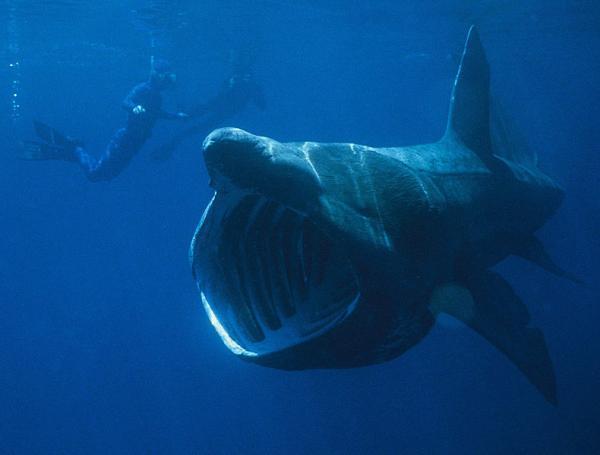Explain the disappearance of the world's second largest fish
Researchers have recently discovered where sharks are exposed - the second largest fish in the world - hiding for about half a year, according to an online publication published this May 7 in Current Biology. . The study has changed the understanding of these fish scientists and emphasized our little understanding of the world's largest marine species.
Gregory Skomal of the Massachusetts Department of Fisheries said: 'Although frequently observed in surface waters during the summer and fall months, the disappearance of sharks exposed during winter is the source of The controversy has been fierce since an article was published in 1954 that they hibernate under the seabed during that time. About 50 years later, we solved the mystery and completely redefined the previous distribution of dried sharks'.
Using satellite tracking technology and a new geolocation technique, researchers have found exposed sharks migrating across the ocean across the tropical waters of the Atlantic in winter, they move below a depth of about 200 to 1,000 m. Their data shows that this shark occasionally lives under that depth every week or even months. Skomal said: 'That way, they completely avoid the discovery of people for millennia.' Skomal also emphasized that as one of the largest species of ocean, exposed sharks grow to over 10 meters and weigh up to 7 tons.
Skomal said they were completely surprised when they first obtained a signal from fish tracked from the tropical waters of the western Atlantic Ocean, in the vicinity of the Caribbean Sea and the Bahamas. After all, dried sharks have always been thought to be sharks that live in cold waters, they just narrow the area to live in temperate regions.

Exposed shark.(Photo: Chris Gotschalk [http://www.piscoweb.org/who/techs/cgotschalk.html], courtesy of Wikimedia Commons)
. The biggest challenge is that they disappear for a long time, they also eat mainly plankton. This means that they cannot be easily captured by conventional methods thanks to fishing rods. Even when they are found near the sea surface, they also live in cold waters of plankton that make underwater observation and diving scuba diving limited.
The team's findings are of great significance for the preservation of exposed sharks. They are showing some signs of decline from the second half of the last century, and are listed as endangered animals on the list of the International Commission for Conservation of Nature.
Skomal said: 'Combined with recent genetic information, our findings suggest that populations of Atlantic and populations still known in the world are interrelated and perhaps just a single population. So global populations of sharks may be smaller than we think. ' Efforts to increase the number of exposed sharks therefore need to be carried out on a global scale.
The study participants included Gregory B. Skomal (Massachusetts Marine Fisheries), Master Oak Bluffs, Stephen I. Zeeman (University of New England, Biddeford), John H. Chisholm (Massachusetts Marine Fisheries, New Bedford ), Erin L. Summers (Maine Marine Resources Board, Boothbay Harbor), Harvey J. Walsh (Woods Hole Oceanographic Institution), Kelton W. McMahon (Woods Hole Oceanographic Institution, Woods Hole), and Simon R Thorrold (Woods Hole, Woods Hole Oceanographic Institution).
References
Gregory B. Skomal, Stephen I. Zeeman, John H. Chisholm, Erin L. Summers, Harvey J. Walsh, Kelton W. McMahon, and Simon R. Thorrold.Transequatorial Migrations by Basking Sharks in the Western Atlantic Ocean.Current Biology, 2009;DOI: 10.1016 / j.cub.2009.04.019
Some factors that make sharks to become species difficult to study
- Scientists explain the phenomenon of sex change in fish
- Things you do not know about marine fish statues
- Decode the disguise of fish
- The mysterious disappearances at the
- These fish hold record in nature
- The mystery of the world's largest sailing ship
- Discover the skull of Britain's largest dog species
- The largest animals are extinct
- Top 6 largest fish in the ocean
- Discovered a new giant moonfish, weighing up to 2 tons
- Learning about fish with Lucky Fish helps prevent anemia
- Mekong River fish ranked
 Animal 'suffering' after hibernation
Animal 'suffering' after hibernation Why do goats climb well?
Why do goats climb well? Scientists were surprised to see chimpanzees eating turtles
Scientists were surprised to see chimpanzees eating turtles Giant catfish died deadly due to drought in Thailand
Giant catfish died deadly due to drought in Thailand